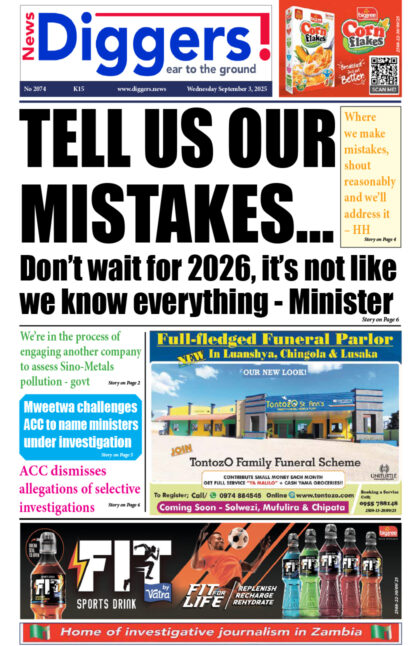Former Director of Public Prosecutions Muntembo Nchinto has charged that PF sympathiser Chanoda Ngwira is being used by some people with legal minds to interfere with proceedings in a matter in which he is challenging his removal as DPP.
This was after Chanoda failed to explain what he meant by “character evidence” in his letters to Supreme Court Judges Mumba Malila and Albert Woods, where he threatened to commence private criminal proceedings against the judges if they proceeded to give witness statements against the State.
Meanwhile, Chanoda says he has reported justices Malila and Woods to Woodlands Police Station so that they can be investigated for accepting to be witnesses without prior clearance from the court.
In this matter, Mutembo had applied for leave in the Constitutional Court to commence contempt proceedings against Chanoda for threatening justices with criminal action if they did not step down.
When the matter came up for hearing, Tuesday, before a full bench of five Constitutional Court judges; Mungeni Mulenga, Enock Mulembe, Palan Mulonda, Prof Margaret Munalula and Martin Musaluke, Mutembo said witnesses should be free to testify without any intimidation or theats adding that it was difficult for him to get those two witnesses.
He submitted that Chanoda’s conduct undermined the due administration of justice and was therefore contemptuous.
“The conduct of the alleged conteminor was an attempt to pervert the course of justice. It is clear that his goal is to prevent the witnesses from giving evidence. The sole purpose of proceeding with contempt is to give the court the power to ensure that it’s able to protect it’s function by ensuring that the administration of justice is not obstructed,” he said.
Mutembo prayed that Chanoda be committed for contempt.
However, before Mutembo, who is the only witness in this matter, could be cross examined, Chanoda’s lawyer Kennedy Mambwe asked for guidance from the court saying the petitioner should show from the evidence whether Chanoda had a case to answer.
Justice Mulenga however told Mambwe to state his position on whether there was any dispute on the facts in terms of the two letters.
In response, Mambwe said the burden of proving that those letters addressed to the two judges were written by Chanoda, lay in the petitioner.
He said Chanoda did not dispute writing the said letters, but how they were published on social media, he was not admitting.
At this point, justice Mulenga asked Chanoda to take the stand and state his facts so that it could be determined whether it was contempt.
In his examination in chief, Chanoda admitted writing the said letters.
And in cross examination, Chanoda explained that the purpose of writing the said letters and publishing them on his Facebook page was to inform the public that the said justices committed an offence by accepting to be witnesses against the State when they were officers of the Judiciary.
He added that it was also to inform the public of his intended action if the two justices did not do as per his demands.
Asked how he was going to stop “a commission of an offence” as he stated in his affidavit in opposition, Chanoda said he intended to stop a crime by going for private prosecution against the two judges.
Asked when he became a lawyer or crimes investigator, Chanoda said he was not one, that’s why he had asked the justices to step down to allow investigations.
Further asked if he knew what character evidence was as he stated in his letters, Chanoda failed to define the concept.
Chanoda, however, said what he had stated in his letters was that, “I notice that section 5,4 of the judicial code of conduct act prohibits you as judicial officers from acting as witness to the character of Mr Mutembo Nchito.”
Asked what the judges said about his (Mutembo’s) character in their witness statements which caused him to give them a five day ultimatum, Chanoda admitted that, that was not in the letters.
At this point, Mutembo put it to him that he did not write the said letters but was being used by someone with a legal mind to interfere with the proceedings.
“I put it you that you did not write this letter, you were being used to interfere with the proceedings before this court by some people who know the law better than you,” Mutembo said.
But Chanoda insisted that he was the one who wrote the letters.
Mutembo, however, told him that it was better to say sorry when his accusations couldn’t be backed up but Chanoda insisted that he was able to produce backup evidence.
“You admit that you don’t know what character evidence is. You are accusing judges of the Supreme Court, lawyers about things you know nothing about. You don’t know. It’s better when you have made a mistake to say ‘sorry I was talking about things that I don’t know’. You don’t know the law yourself do you,” said Mutembo.
Asked when he was commencing the private prosecution after giving the judges a five-day ultimatum, Chanoda said he had already started.
“I have actually reported the matter to the police, Woodlands Police Station. I wrote to the two justices so that they can know that they committed an offence by accepting to be witnesses without prior clearance from the court,” Chanoda said.
The matter comes up on December 10, 2018 for final hearing.
























